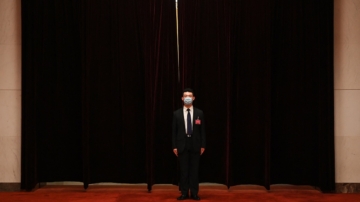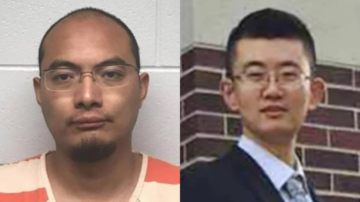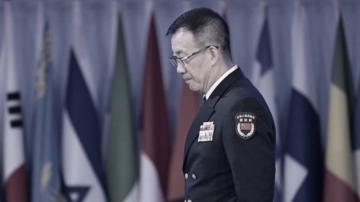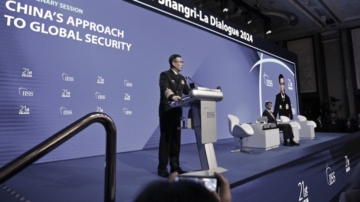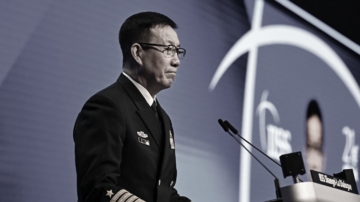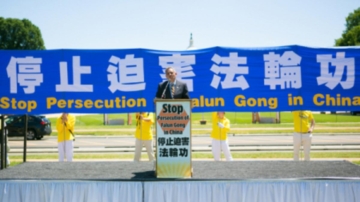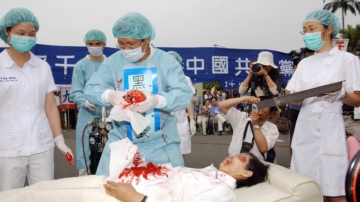【新唐人2014年02月14日訊】美國「保護記者委員會」日前發表有關新聞自由的最新年度報告指出,過去兩年,全球記者被殺害和囚禁的情況特別嚴峻,甚至過去享有新聞自由的香港,媒體報導中國議題時,已經不如從前的猛烈批評。還有,記者因受到來自中國大陸的壓力,而自我審查。
總部設在美國的「保護記者委員會(CPJ)」,12號在香港發表報告指出,中共當局對香港與台灣媒體施壓的行為日趨嚴重。
報告作者因害怕就業受到影響,拒絕署名,但他引述「香港記者協會」副主席任美貞、與香港立法會議員毛孟靜的話說,香港2012年的選舉,是北京干預香港媒體的轉折點。
2012年,在香港行政長官選舉的競選過程中,香港「中聯辦」官員曾致電《信報》,對有關現任特首梁振英的批判報導提出怨言。此外,親北京的《成報》,對知名時事評論員劉銳紹的一篇文章,進行大幅竄改,使文章從批評梁振英,變成支持梁振英。
報告分析指出,香港新聞工作者與學術界人士擔心,香港的媒體領袖正被吸納進中國的政治精英圈。如「星島新聞集團」主席何柱國、Now寬頻電視與《信報財經新聞》東主李澤楷,和有線電視母公司「九龍倉集團」主席吳光正等人,紛紛成為了中國人大或政協委員。
香港自由撰稿人張成覺:「剛剛看到今天的消息,香港的商業電臺把李惠玲,一個很有名的女的主持人給撤職了,那麼這個李惠玲是在宣傳言論自由,或者說在表達香港民眾的意願方面,她是做了很多工作的,現在她被免職了,意味著甚麼呢?從商業電臺本身來說,它可能有別的考慮,但是不能排除這裡面啊是中共對商業電臺的老闆施加壓力,否則一個很受歡迎的主持人,不會無緣無故的被免職。」
香港國際記者聯會胡麗雲:「她(李惠玲)是一個比較敢言的主持人,雖然沒有說背後的原因是甚麼,我們很清楚的看見,這一類的事情,已經很明顯指出,香港新聞自由已經放到一個危險的位置裡面了。」
「保護記者委員會」的新聞公告指出,最近香港《明報》撤換編輯、和香港電視網絡(HKTV)不獲簽發免費電視廣播執照,以及,台灣「旺旺集團」收購《中國時報》事件所引發的群眾示威,都顯示了兩地民眾對新聞自由受北京衝擊的擔憂。
台灣記者協會會長陳曉宜:「第一個就是媒體所有權人轉換的部分,在台灣比較明顯的例子,這就是旺中集團,自從《中國時報》換了老闆之後,它的整個新聞走向就有很大的改變,這個媒體新聞專業的表現也逐漸的下降,那在對中國新聞的採訪上也是極度傾中的,包括他們置入性行銷的中國新聞,這個部分就越來越嚴重。」
報告還說,台灣媒體的老闆們,為了保護各自在大陸的商業利益,也在不斷推動他們的媒體機構「拍北京的馬屁」。因為不批評中國的媒體,將獲得更多的廣告收入。
陳曉宜:「我們在反媒體壟斷過程當中,因為反的是旺中集團,反的是中嘉系統臺,所以其他的有線電視臺竟然也都不太報導,其實主要的原因就是因為他們害怕得罪了這個系統老大哥之後,未來有可能頻道沒有辦法上架,這件事情就可以看的出來,當你掌握了系統通路之後,有可能對其他媒體的新聞自由產生一定的影響力。」
對於中國、台灣兩峽兩岸相互開放媒體,互設辦公室的議題,「台灣記者協會」會長陳曉宜認為,大陸媒體情報蒐集的動作大於新聞發佈。
陳曉宜:「我們看香港的例子,《新華社》香港分社,在2000年之後,直接改成中聯辦,直接實質的控制香港媒體,那未來的《新華社》台灣分社,如果真的有的話,來到台灣之後它絕對不是一個只是新聞報導的機構而已。」
另外,根據「保護記者委員會」的統計,去年2013年,全球有70人因採訪工作而喪生,另有211名記者因為工作而遭到囚禁,而中國是監禁記者人數最多的國家之一,僅次於土耳其、伊朗。
採訪/常春 編輯/黃億美 後製/陳建銘
Report: Press Freedom under Threat in Hong Kong and Taiwan
The latest annual press freedom report by New York based
Committee to Protect Journalists (CPJ),
revealed the killing and imprisonment of journalists has been
grim for the past two years.
Even Hong Kong’s media no longer reports China issues as
critically as it once did.
Many reporters even conduct self-censorship due to the
pressure from mainland China.
Text : CPJ released the report on Feb.12h in Hong Kong,
stating journalists in Hong Kong and Taiwan are
facing big threats from Beijing.
The author chose not to be identified to avoid professional
repercussions.
Yet the author indicated that both Shirley Yam, HKJA's
(Hong Kong Journalists Association), vice-chairwoman
and legislator Claudia Mo,
told CPJ they believed Beijing to be meddling in media
coverage of Hong Kong's 2012 election.
They truly felt this was a major turning point
for the chief executive.
According to newspaper reports, In 2012 during the campaign
to elect Hong Kong's current leader, Leung Chun-ying,
who was propaganda chief of China's representative
agency in Hong Kong,
the Liaison Office called the owner of daily Hong Kong
newspaper Economic Journal,
complaining about the newspaper's critical
coverage of Leung.
Also, the pro-Beijing Sing Pao newspaper, twisted an opinion
piece by commentator Johnny Lau,
so much so that it ended up saying the complete opposite
to what he had intended.
Reports revealed journalists & academics were concerned city
media leaders are being absorbed into China's political elite.
For instance, Charles Ho of Sing Tao news group, Richard Li
of Now TV and the Hong Kong Economic Journal,
and Peter Woo of i-Cable television, all accepted appointments
to the National People's Congress (NPC),
and to the Chinese People's Political Consultative
Conference (CPPCC).
Zhang Chengjue, Hong Kong freelance writer: "It was just
released that Lee Wai-ling has just been dismissed.
“She has been an outspoken host in publicizing free speech and
of people’s free will.
“What does her dismissal mean?
To the radio, there might be some other considerations.
“However, it is inevitable to believe that the Communist regime
has put pressure on to the radio station.
“Otherwise, why would a popular program host be let go all
of a sudden for no reason?"
Hu Liyun, International Federation of Journalists Asia-Pacific
Project Office: "She (Li Wai-ling) is an outspoken host.
“We can clearly see the reason behind her dismissal.
“It shows clearly the media freedom in Hong Kong has been
compromised due to such pressure."
CPJ’s report indicated that recent protests over Hong Kong’s
Ming Pao replacing its editor,
Hong Kong’s Television Network
(HKTV) being rejected its license application,
& Taiwan's Want Want China Times Group acquiring China Times,
has shown people’s concern about freedom of press and
Beijing’s influence over it.
Shiau-Yee Chen, President of the Association of Taiwan
Journalists: "The first issue is the change of media ownership.
“In Taiwan it’s very obvious when China Times’ owner was
changed to Want Want China Times Group,
“the report has since changed its direction.
For instance, the journalists’ profession is gradually decreased,
“and reports on China are pro-Communist, including news
from China for propaganda purposes are getting more serious."
The CPJ report also said that media owners in Taiwan, in order
to protect their business,
don't want to lose advertising revenue from Chinese companies
and they don't want to anger central government.
Shiau-Yee Chen: "In our process of opposing the media, since
it’s about the Want Want China Times Group,
“other cable stations didn’t dare report our opposition
for fear of offending the Big Brother of the media.
“They also didn’t want to affect the air of their
programs either.
“It shows that Big Brother can affect the rest of media
and the freedom of press."
As for establishing mutual media offices between
Taiwan & China,
President of the Association of Taiwan Journalists, Shiau-Yee Chen,
believes intelligence gathering purpose’s hold greater sway,
in the eyes of Communist leaders,
than reporting intelligent and precise news.
Shiau-Yee Chen: "We see that when Xinhua News Agency
in Hong Kong became the Liaison Office in 2000,
“it has since directly controlled Hong Kong’s media.
“Once Xinhua News Agency in Taiwan is established,
it will no longer be just a news agency any more."
Also, according to CPJ’s analysis, in 2013, 70 journalists have
died during their work,
and 211 journalists have been
imprisoned because of their work.
Along side Turkey and Iran, China has one of the most
imprisoned journalists
Interview/ChangChun Edit/Huangyimei Post-Production/Chengjianmien
總部設在美國的「保護記者委員會(CPJ)」,12號在香港發表報告指出,中共當局對香港與台灣媒體施壓的行為日趨嚴重。
報告作者因害怕就業受到影響,拒絕署名,但他引述「香港記者協會」副主席任美貞、與香港立法會議員毛孟靜的話說,香港2012年的選舉,是北京干預香港媒體的轉折點。
2012年,在香港行政長官選舉的競選過程中,香港「中聯辦」官員曾致電《信報》,對有關現任特首梁振英的批判報導提出怨言。此外,親北京的《成報》,對知名時事評論員劉銳紹的一篇文章,進行大幅竄改,使文章從批評梁振英,變成支持梁振英。
報告分析指出,香港新聞工作者與學術界人士擔心,香港的媒體領袖正被吸納進中國的政治精英圈。如「星島新聞集團」主席何柱國、Now寬頻電視與《信報財經新聞》東主李澤楷,和有線電視母公司「九龍倉集團」主席吳光正等人,紛紛成為了中國人大或政協委員。
香港自由撰稿人張成覺:「剛剛看到今天的消息,香港的商業電臺把李惠玲,一個很有名的女的主持人給撤職了,那麼這個李惠玲是在宣傳言論自由,或者說在表達香港民眾的意願方面,她是做了很多工作的,現在她被免職了,意味著甚麼呢?從商業電臺本身來說,它可能有別的考慮,但是不能排除這裡面啊是中共對商業電臺的老闆施加壓力,否則一個很受歡迎的主持人,不會無緣無故的被免職。」
香港國際記者聯會胡麗雲:「她(李惠玲)是一個比較敢言的主持人,雖然沒有說背後的原因是甚麼,我們很清楚的看見,這一類的事情,已經很明顯指出,香港新聞自由已經放到一個危險的位置裡面了。」
「保護記者委員會」的新聞公告指出,最近香港《明報》撤換編輯、和香港電視網絡(HKTV)不獲簽發免費電視廣播執照,以及,台灣「旺旺集團」收購《中國時報》事件所引發的群眾示威,都顯示了兩地民眾對新聞自由受北京衝擊的擔憂。
台灣記者協會會長陳曉宜:「第一個就是媒體所有權人轉換的部分,在台灣比較明顯的例子,這就是旺中集團,自從《中國時報》換了老闆之後,它的整個新聞走向就有很大的改變,這個媒體新聞專業的表現也逐漸的下降,那在對中國新聞的採訪上也是極度傾中的,包括他們置入性行銷的中國新聞,這個部分就越來越嚴重。」
報告還說,台灣媒體的老闆們,為了保護各自在大陸的商業利益,也在不斷推動他們的媒體機構「拍北京的馬屁」。因為不批評中國的媒體,將獲得更多的廣告收入。
陳曉宜:「我們在反媒體壟斷過程當中,因為反的是旺中集團,反的是中嘉系統臺,所以其他的有線電視臺竟然也都不太報導,其實主要的原因就是因為他們害怕得罪了這個系統老大哥之後,未來有可能頻道沒有辦法上架,這件事情就可以看的出來,當你掌握了系統通路之後,有可能對其他媒體的新聞自由產生一定的影響力。」
對於中國、台灣兩峽兩岸相互開放媒體,互設辦公室的議題,「台灣記者協會」會長陳曉宜認為,大陸媒體情報蒐集的動作大於新聞發佈。
陳曉宜:「我們看香港的例子,《新華社》香港分社,在2000年之後,直接改成中聯辦,直接實質的控制香港媒體,那未來的《新華社》台灣分社,如果真的有的話,來到台灣之後它絕對不是一個只是新聞報導的機構而已。」
另外,根據「保護記者委員會」的統計,去年2013年,全球有70人因採訪工作而喪生,另有211名記者因為工作而遭到囚禁,而中國是監禁記者人數最多的國家之一,僅次於土耳其、伊朗。
採訪/常春 編輯/黃億美 後製/陳建銘
Report: Press Freedom under Threat in Hong Kong and Taiwan
The latest annual press freedom report by New York based
Committee to Protect Journalists (CPJ),
revealed the killing and imprisonment of journalists has been
grim for the past two years.
Even Hong Kong’s media no longer reports China issues as
critically as it once did.
Many reporters even conduct self-censorship due to the
pressure from mainland China.
Text : CPJ released the report on Feb.12h in Hong Kong,
stating journalists in Hong Kong and Taiwan are
facing big threats from Beijing.
The author chose not to be identified to avoid professional
repercussions.
Yet the author indicated that both Shirley Yam, HKJA's
(Hong Kong Journalists Association), vice-chairwoman
and legislator Claudia Mo,
told CPJ they believed Beijing to be meddling in media
coverage of Hong Kong's 2012 election.
They truly felt this was a major turning point
for the chief executive.
According to newspaper reports, In 2012 during the campaign
to elect Hong Kong's current leader, Leung Chun-ying,
who was propaganda chief of China's representative
agency in Hong Kong,
the Liaison Office called the owner of daily Hong Kong
newspaper Economic Journal,
complaining about the newspaper's critical
coverage of Leung.
Also, the pro-Beijing Sing Pao newspaper, twisted an opinion
piece by commentator Johnny Lau,
so much so that it ended up saying the complete opposite
to what he had intended.
Reports revealed journalists & academics were concerned city
media leaders are being absorbed into China's political elite.
For instance, Charles Ho of Sing Tao news group, Richard Li
of Now TV and the Hong Kong Economic Journal,
and Peter Woo of i-Cable television, all accepted appointments
to the National People's Congress (NPC),
and to the Chinese People's Political Consultative
Conference (CPPCC).
Zhang Chengjue, Hong Kong freelance writer: "It was just
released that Lee Wai-ling has just been dismissed.
“She has been an outspoken host in publicizing free speech and
of people’s free will.
“What does her dismissal mean?
To the radio, there might be some other considerations.
“However, it is inevitable to believe that the Communist regime
has put pressure on to the radio station.
“Otherwise, why would a popular program host be let go all
of a sudden for no reason?"
Hu Liyun, International Federation of Journalists Asia-Pacific
Project Office: "She (Li Wai-ling) is an outspoken host.
“We can clearly see the reason behind her dismissal.
“It shows clearly the media freedom in Hong Kong has been
compromised due to such pressure."
CPJ’s report indicated that recent protests over Hong Kong’s
Ming Pao replacing its editor,
Hong Kong’s Television Network
(HKTV) being rejected its license application,
& Taiwan's Want Want China Times Group acquiring China Times,
has shown people’s concern about freedom of press and
Beijing’s influence over it.
Shiau-Yee Chen, President of the Association of Taiwan
Journalists: "The first issue is the change of media ownership.
“In Taiwan it’s very obvious when China Times’ owner was
changed to Want Want China Times Group,
“the report has since changed its direction.
For instance, the journalists’ profession is gradually decreased,
“and reports on China are pro-Communist, including news
from China for propaganda purposes are getting more serious."
The CPJ report also said that media owners in Taiwan, in order
to protect their business,
don't want to lose advertising revenue from Chinese companies
and they don't want to anger central government.
Shiau-Yee Chen: "In our process of opposing the media, since
it’s about the Want Want China Times Group,
“other cable stations didn’t dare report our opposition
for fear of offending the Big Brother of the media.
“They also didn’t want to affect the air of their
programs either.
“It shows that Big Brother can affect the rest of media
and the freedom of press."
As for establishing mutual media offices between
Taiwan & China,
President of the Association of Taiwan Journalists, Shiau-Yee Chen,
believes intelligence gathering purpose’s hold greater sway,
in the eyes of Communist leaders,
than reporting intelligent and precise news.
Shiau-Yee Chen: "We see that when Xinhua News Agency
in Hong Kong became the Liaison Office in 2000,
“it has since directly controlled Hong Kong’s media.
“Once Xinhua News Agency in Taiwan is established,
it will no longer be just a news agency any more."
Also, according to CPJ’s analysis, in 2013, 70 journalists have
died during their work,
and 211 journalists have been
imprisoned because of their work.
Along side Turkey and Iran, China has one of the most
imprisoned journalists
Interview/ChangChun Edit/Huangyimei Post-Production/Chengjianmien

